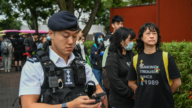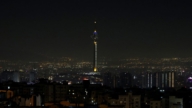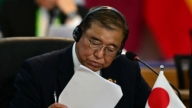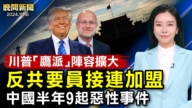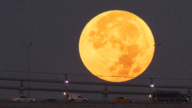【新唐人2012年1月18日讯】日本政府日前决定正式命名39个无人岛屿,其中包括钓鱼台列岛附属7座无名小岛,北京和台湾外交部对此表达抗议。日前,中国渔政船驶入钓鱼岛海域,再次遭到日本巡逻船拦截。钓鱼岛主权争端新年再度加剧,也增大了引发中日冲突的风险。
日本内阁官房长官1月16号在记者会上宣称,日本计划3月底以前完成东海尖阁诸岛、也就是钓鱼岛周边39个无人小岛的命名,并划入日本新的地图。
日方强调,这些无名小岛存在于2010年中日尖阁诸岛附近撞船现场周边,是依据日本200海里排他性经济海域的基准。
1994年起生效的《联合国海洋公约》规定,沿海国家从领海界限算起有不超过200海里的专属经济海域。中日各自主张拥有钓鱼岛主权,各自划分的东海界限及经济海域存在双方重叠的争议。
“中国外交学院亚太研究中心”主任苏浩教授表示,日本单方面的行为不符合国际法。
苏浩:“作为国际惯例来说,如果存在争议的海域,或者存在争议的岛屿以及大陆架,那么,存在争议的地区在问题没有解决之前,别的国家没有单方面的这种权力,来明显的划定海区或者给予它进行排他性的管辖。所以,从这个角度来说,日本的行为是不符合国际法的规定。”
17号,台湾外交部向日本表达严正抗议。外交部发言人章计平重申,钓鱼台列岛是中华民国固有疆域,中华民国秉持主权在我、搁置争议、共同开发、和平互惠的原则,呼吁各方致力于区域和平稳定。
中华民国外交部发言人章计平:“要求日方一定要自我克制,不要用任何的言语或行动来侵犯中华民国的领土主权,损及到我们跟日本的双边关系。对于后续的发展,我们当然会密切因应来注意,我们一定会全力的捍卫、维护国家应有的尊严以及权益。”
中国渔政船13号驶入钓鱼岛海域,再次遭到日本多艘巡逻船拦截。3号,包括2名冲绳议员在内的4名日本人登上钓鱼岛,引起中方强烈抗议。
香港城市大学政治学教授郑宇硕表示,日方议员登陆钓鱼岛打破了中、日政府早有的“不登岛”默契。
“香港城市大学”教授郑宇硕:“中国一直避免刺激日本,但是日本方面没有这样做,所以,中国的保卫钓鱼岛主权的团体就不很满意。要是双方都不派人登陆钓鱼岛,这个是可以接受的,但是,要是日本人去,那中国人也应该可以去。中国传统上,中国大陆政府外交的事情不允许民间团体碰。”
对此,网民们的愤怒高涨到极点。而中国民间保钓团体4号发起的抗议活动,却遭到警告和打压﹔来自香港、大陆和台湾的民间保钓团体计划出海到钓鱼岛,也遭到港府拦截。
香港“保钓行动委员会”主席陈妙德表示,维护钓鱼岛主权的行动不会放弃。
陈妙德:“我们的政府只会打压自己的子民,对于外交方面太过软弱了,我们出海它也不给,为了什么嘛?而且,这简直是丧权辱国!”
日本首相去年底访华,没有就东海油气田争议取得进展。日本外相日前从海上视察与俄罗斯有领土争议的北方四岛。在新的一年里,东亚领土主权争端面临冲突激化的风险。
新唐人记者常春、李元翰、王明宇采访报导。
Taiwan and Mainland China Protest Japan’s Decision to Name Seven Diaoyu Islands
The Japanese government decided to formally name 39
uninhabited islands, including 7 of the Diaoyu Islands.
Both Beijing and Taiwan foreign ministries protested the move.
Recently, a Chinese fishing boat again entered the ocean
near the Diaoyu islands, but was stopped by Japanese patrol boats.
A sovereignty dispute of over the Diaoyu islands has heated
up again, increasing the chance of a Sino-Japan conflict.
Japan’s Chief Cabinet Secretary announced on Monday at a
news conference that, by end of March, Japan plans to
name 39 uninhabited islands on the new Japanese map,
some of which are part of the Diaoyu Islands,.
Japan stressed that these unnamed islands are near the
location of the 2010 Chinese-Japanese crash,
and is within Japan’s 200 nautical miles economic zone.
According to the United Nations Convention on the Law of
the Sea signed in 1994,
coastal countries have ownership of an economic zone of
less than 200 nautical miles.
China and Japan both claim ownership of the Diaoyu islands,
and set different boundaries for the East China Sea and economical zones.
Su Hao, “According to international tradition, if an ocean,
island, or other continental land is under dispute,
then before the dispute is resolved, no country has the right
to declare boundaries or rule over the region.
From this point of view, Japan’s actions violate
international regulations.”
On the 17th, Taiwan’s foreign ministry expressed severe
protest of Japan’s actions.
Foreign Ministry spokesman Zhang Jiping stressed that
the Diaoyu Islands are an integral part of the Republic of China.
The Republic of China has a policy of claiming ownership,
putting aside dispute, and seeking mutual, peaceful development.
He urged all parties to maintain peaceful and stable
development of the area.
Zhang Jiping, “We request that Japan restrain itself, not use
any language or actions that would invade sovereignty of the Republic of China or damage our relationship.
We will closely watch future development, and are determined
to guard and protect the sovereignty and interest of our nation.”
On the 3rd, four Japanese, including two Okinawa legislators,
landed in the Diaoyu islands, drawing Chinese protest.
A Chinese fishing boat entered the Diaoyu islands on the
13th, but was intercepted by many Japanese patrol boats.
City University of Hong Kong political science professor
Chung Yushi expressed that
Japanese legislators landing on the island broke an unspoken
agreement between China and Japan of “No Landing.”
Chung Yushi, “China always avoids provoking Japan,
but Japan hasn’t done the same,
so Chinese groups for protecting sovereignty of the
Diaoyu Islands are very angry.
If no one lands on the island, that’s acceptable, but if the
Japanese do, the Chinese should too.
Traditionally, the mainland Chinese government does not
allow civilian groups to interfere with foreign diplomacy.”
Regarding this, Chinese netizens are furious.
However, protesters were warned and protest activities
started by the general public were suppressed.
Many Hong Kong, Mainland, and Taiwanese groups planned
to sail to the Diaoyu Islands, but were intercepted by the Hong Kong government.
Hong Kong “Protect Diaoyu Islands” committee president,
Chen Miaode,
expressed that they will not give up on
protecting sovereignty of the Diaoyu islands.
Chen Miaode, “Our government only knows how to suppress
its own citizens, but is too soft on foreign issues.
We want to sail but it (Chinese regime) won’t let us, why?
This is a disgrace to the country!”
The Japanese Prime Minister visited China last year, but
didn’t make any progress on the dispute over East China Sea Oil and Gas’exploration. A Japanese Foreign Minister recently went to look at the
Kuril Islands, which is under dispute between Japan and Russia.
In the new year, border disputes in Asia will reach
a new, dangerous level.
NTD reporters Chang Chun, Li Yuanhan and Wang Mingyu


